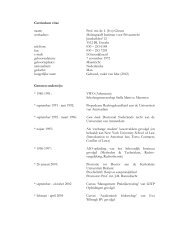Rapport definitief herziene versie - Ivo Giesen
Rapport definitief herziene versie - Ivo Giesen
Rapport definitief herziene versie - Ivo Giesen
You also want an ePaper? Increase the reach of your titles
YUMPU automatically turns print PDFs into web optimized ePapers that Google loves.
"Clarity as to the liability issues may have a positive impact on access to and the<br />
exploitation of public sector information. In fact, liability may be a reason for the<br />
public sector to operate a prudent information policy. If the public body provides<br />
information to a requestor directly it could, in principle, be liable (in accordance<br />
with national liability laws) for any damages caused to the citizen concerned.<br />
The issue becomes more complex when more than two parties (public body,<br />
requester) are involved in the processing and dissemination of information. This is<br />
the case, for example, when the public sector has ceded the information to a<br />
private company. In that case, public bodies could still be liable for the information<br />
provided, unless they have limited this liability by contract.<br />
The more actors are involved, the more difficult it becomes, in cases of conflict, to<br />
identify the one who has defaulted or acted unlawfully. Some commentators<br />
believe that coordinated European approaches to this issue are particularly<br />
important in view of the difficulty of establishing which national law applies in<br />
cases involving several countries."<br />
Waarna als vraag nummer 8 volgt:<br />
"To what extent may the different Member States’ liability regimes represent an<br />
obstacle to access or exploitation of public sector information?"<br />
7.6.3 Deze vraagstelling die in wezen niet verschilt van de vraagstelling zoals die aan dit<br />
onderzoek ten grondslag ligt, verraad in elk geval, maar ook niet veel meer dan dat, dat<br />
de vraag naar de aansprakelijkheid van de overheid een belangrijke is, ook in het kader<br />
van een eventueel nieuw beleid van meer openheid bij de informatie-verstrekking. Een<br />
antwoord op de vraag hoe de eventuele aansprakelijkheid van de overheid dan geregeld is<br />
in Europa, vinden wij hier echter niet.<br />
7.6.4 In het kader van de Raad van Europa lijken eerder aanwijzingen gevonden te kunnen<br />
worden. In 1984 werd Recommendation R (84) 15 met betrekking tot<br />
overheidsaansprakelijkheid aangenomen. 434 Daarin is, onder meer om meer eenheid te<br />
bereiken, onder andere bepaald in Principle I:<br />
‘Reparation should be ensured for damage caused by an act due to a failure of a<br />
public authority to conduct itself in a way which can reasonably be expected from<br />
it in law in relation to the injured person. Such a failure is presumed in case of<br />
transgresion of an established legal rule.’<br />
en in Principle II:<br />
‘1. Even if the conditions stated in Principle I are not met, reparation should be<br />
ensured if it would be manifestly unjust to allow the injured person alone to bear<br />
the damage, having regard to the following circumstances: the act is in the<br />
general interest, only one person or a limited number of persons have suffered the<br />
434 . Recommendation No. R (84) 15 relating to public liability, adopted by the Committee of<br />
Ministers of the Council of Europe on 18 September 1984 (samen met het ‘explanatory<br />
memorandum’ gepubliceerd (Strasbourg 1985)).<br />
139





